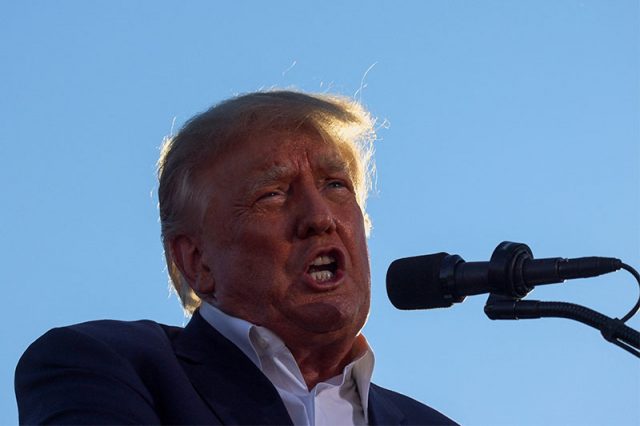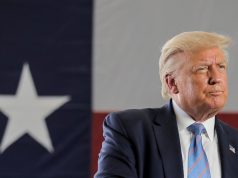
The U.S. Supreme Court on Thursday rejected former President Donald Trump‘s bid to have an independent arbiter vet classified documents that were seized by the FBI from his Florida home as part of his legal battle against investigators probing his handling of sensitive government records.
The justices in a brief order denied Trump‘s October 4 emergency request to lift a lower court‘s decision that prevented the arbiter from reviewing more than 100 documents marked as classified that were among the roughly 11,000 records seized at his Mar-a-Lago estate in Palm Beach on August 8.
There were no publicly noted dissents by any of the nine justices to the decision, which came two days after the U.S. Justice Department urged them to deny Trump‘s request and keep the classified documents out of the hands of the arbiter, known as a special master.
The court‘s 6-3 conservative majority includes three justices appointed by Trump, who left office in January 2021.
Federal officials obtained a court-approved warrant to search Trump‘s residence in a Justice Department criminal investigation after suspecting that not all classified documents in his possession had been returned after his presidency ended.
Investigators searched for evidence of potential crimes related to unlawfully retaining national defense information and obstructing a federal investigation. Trump has denied wrongdoing and has called the investigation politically motivated.
Trump went to court on August 22 in a bid to restrict Justice Department access to the documents as it pursues its criminal investigation.
U.S. District Judge Aileen Cannon last month agreed to Trump‘s request to temporarily block the government from using the seized materials in its investigation until the special master determined if any could be deemed personal or subject to attorney-client confidentiality or executive privilege — a legal doctrine that shields some White House communications from disclosure — and thus off limits to investigators.
Cannon, who was appointed to the bench by Trump, named retired U.S. Judge Raymond Dearie as the special master. Cannon later refused a Justice Department request to partially lift her order relating only to the documents bearing classified markings of confidential, secret or top secret, which the government argued was impeding an effort to mitigate national security risks from their possible unauthorized disclosure.
Cannon said she could not accept that the documents were indeed classified without review by Dearie.
The Justice Department appealed to the Atlanta-based 11th U.S. Circuit Court of Appeals, which then put on hold Cannon’s decisions related to the classified documents, an action that prevented Dearie from vetting them while letting the government resume its probe. The 11th Circuit noted the importance of limiting access to classified information and ensuring the department’s probe would not be harmed.
The 11th Circuit also rejected any suggestion that Trump had declassified the documents — as the former president has claimed — saying there was “no evidence” of such action and that the argument was a “red herring because declassifying an official document would not change its content or render it personal.”
The three statutes underpinning the search warrant used by the FBI at Mar-a-Lago make it a crime to mishandle government records, regardless of their classification status.
The department’s investigation also seeks to determine who accessed classified materials, whether they were compromised and if any remain unaccounted for.
— Reporting by Andrew Chung in New York; Editing by Will Dunham









